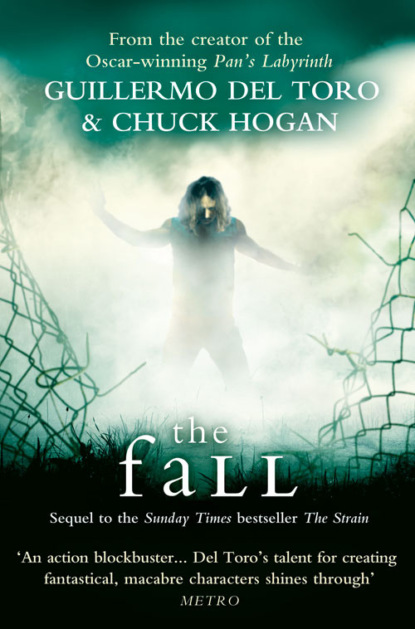По всем вопросам обращайтесь на: info@litportal.ru
(©) 2003-2025.
✖
The Fall
Настройки чтения
Размер шрифта
Высота строк
Поля
THE LOW-SLUNG BUILDING was one of a dozen at the end of the crumbling road, an office park that had been foundering even before the recession hit. It retained the sign of the previous tenant, R. L. Industries, a former armored car dispatcher and garage, and accordingly remained surrounded by a sturdy twelve-foot chain-link fence. Access was by key card through an electronic gate.
The garage half of the interior held the doctor’s cream-colored Jaguar and a fleet of black vehicles befitting a dignitary’s motorcade. The office half had been refitted into a small, private surgery dedicated to servicing one patient.
Eldritch Palmer lay in the recovery room, waking to the usual postoperative discomfort. He roused himself slowly but surely, having made this dark passage to returning consciousness many times before. His surgical team knew well the appropriate mix of sedatives and anesthesia. They never put him under deeply anymore. At his advanced age, it was too risky. And for Palmer, the less anesthesia used the faster he recovered.
He remained connected to machines testing the efficiency of his new liver. The donor had been a teenage Salvadorian runaway, tested to be disease-, drug-, and alcohol-free. A healthy, young, pinkish-brown organ, roughly triangular in shape, similar to an American football in size. Fresh off a jet plane, fewer than fourteen hours since harvesting, this allograft was, by Palmer’s own count, his seventh liver. His body went through them the way coffee machines go through filters.
The liver, both the largest internal organ and the largest single gland in the human body, has many vital functions, including metabolism, glycogen storage, plasma synthesis, hormone production, and detoxification. Currently, there was no medical way to compensate for its absence in the body—which was most unfortunate for the reluctant Salvadorian donor.
Mr. Fitzwilliam, Palmer’s nurse, bodyguard, and constant companion, stood in the corner, ever-vigilant in the manner of most ex-Marines. The surgeon entered, still wearing his mask, pulling on a fresh pair of gloves. The doctor was fastidious, ambitious, and, even by most surgeons’ standards, incredibly wealthy.
He drew back the sheet. The newly stitched incision was a reopening of an older transplantation scar. Outwardly, Palmer’s chest was a lumpy tableau of disfiguring scars. His interior torso was a hardened basket of failing organs. That was what the surgeon told him: “I am afraid your body cannot sustain any more tissue or organ allografts, Mr. Palmer. This is the end.”
Palmer smiled. His body was a hive of other people’s organs, and in that way he was not dissimilar from the Master, who was the embodiment of a hive of undead souls.
“Thank you, doctor. I understand.” Palmer’s voice was still raw from the breathing tube. “In fact, I suggest that you strike this surgery altogether. I know you are concerned about the AMA finding out about our techniques of organ harvesting, and I hereby release you from obligation. The fee you collect for this procedure will be your last. I will require no further medical intervention—not ever.”
The surgeon’s eyes remained uncertain. Eldritch Palmer, a sick man for nearly all his life, possessed an uncanny will to live: a fierce and unnatural survival instinct the likes of which the surgeon had never before encountered. Was he finally succumbing to his ultimate fate?
No matter. The surgeon was relieved, and grateful. His retirement had been planned for some time now, and everything was arranged. It was a blessing to be free of all obligations at such a tumultuous time as this. He only hoped the flights to Honduras were still in operation. And burning down this building would draw no inquiries in the wake of so much civil unrest.
All this the doctor swallowed with a polite smile. He withdrew under Mr. Fitzwilliam’s steely gaze.
Palmer rested his eyes. He let his mind go back to the Master’s solar exposure, perpetrated by that old fool, Setrakian. Palmer assessed this development in the only terms he understood: What did it mean for him?
It only sped up the timeline, which, in turn, expedited his imminent deliverance.
At long last, his day was nearly at hand.
Setrakian. Did defeat indeed taste bitter? Or was it more akin to ashes on the tongue?
Palmer had never known defeat—would never know defeat. And how many can say that?
Like a stone in the middle of a swift river, stood Setrakian. Foolishly and proudly believing he was disrupting the flow—when, in fact, the river was predictably running full-speed right around him.
The futility of humans. It all starts out with such promise, doesn’t it? And yet all ends so predictably.
His thoughts turned to The Palmer Foundation. It was indeed expected among the super-rich that each of the world’s wealthiest endow a charitable organization in his own name. This, his one and only philanthropic foundation, had used its ample resources to transport and treat two full busloads of children afflicted by the recent occultation of the Earth. Children struck blind during that rare celestial event—either as a result of peeking at the eclipsed sun without proper optical protection, or else due to an unfortunate defect in the lenses of a batch of child-size safety glasses. The faulty glasses had been traced back to a plant in China, the trail running cold at an empty lot in Taipei …
No expense was to be spared in the rehabilitation and re-education of these poor souls, his foundation pledged. And indeed, Palmer meant it.
The Master had demanded it so.
Pearl Street
EPH FELT THAT they were being followed as they crossed the street. Fet, on the other hand, was focused on the rats. The displaced rodents scurried from door to door and along the sunny gutter, evidently in a state of panic and chaos.
“Look up there,” said Fet.
What Eph thought were pigeons perched on the ledges were, in fact, rats. Looking down, watching Eph and Fet as though waiting to see what they would do. Their presence was instructive as a barometer of the vampire infestation spreading underground, driving rats from their nests. Something about the animal vibrations the strigoi gave off, or else their manifestly evil presence, repelled other forms of life.
“There must be a nest nearby,” said Fet.
They neared a bar, and Eph felt a thirsty tug at the back of his throat. He doubled back and tried the door, finding it unlocked. An ancient bar, established more than 150 years ago—the oldest continually operating ale house in New York City, bragged the sign—but no patrons, and no bartender. The only disruption to the silence was the low chatter of a television in a high corner, playing the news.
They walked to the back bar, which was darker, and just as empty. Half-consumed mugs of beer sat on the tables, and a few chairs still had coats hanging off them. When the party ended here, it had ended abruptly and all at once.
Eph checked the bathrooms—the men’s room containing great and ancient urinals ending in a trough beneath the floor—and found them predictably empty.
He came back out, his boots scuffing the sawdust on the floor. Fet had set down his case and pulled out a chair, resting his legs.
Eph stepped behind the back bar. No liquor bottles or blenders or buckets of ice—just beer taps, with shelves of ten-ounce glass mugs waiting below. The place served only beer. No liquor, which was what Eph wanted. Only its own branded brew, available in either light or dark ale. The old taps were for show, but the newer ones flowed smoothly. Eph poured two dark draughts. “Here’s to …?”
Fet got to his feet and walked to the bar, taking up one of the mugs. “Killing bloodsuckers.”
Eph drained half his mug. “Looks like people cleared out of here in a hurry.”
“Last call,” said Fet, swiping the foam off his thick upper lip. “Last call all over town.”
A voice from the television got their attention, and they walked into the front room. A reporter was doing a live shot from a town near Bronxville, the hometown of one of the four survivors of Flight 753. Smoke darkened the sky behind him, the news crawl reading, BRONXVILLE RIOTS CONTINUE.
Fet reached up to change the channel. Wall Street was reeling from consumer fear, the threat of an outbreak greater than the H1N1 flu, and a rash of disappearances among their own brokers. Traders were shown sitting immobilized while the market averages plummeted.
On NY1, traffic was the focus, every exit out of Manhattan congested with people fleeing the island ahead of a rumored quarantine. Air and rail travel were overbooked, the airports and train station scenes of sheer chaos.
Eph heard a helicopter overhead. A chopper was probably the only easy way in or out of Manhattan now. If you had your own helipad. Like Eldritch Palmer.
Eph found an old-school, hard-wired telephone behind the bar. He got a scratchy dial tone and patiently used the rotary face to dial Setrakian’s.
It rang through, and Nora answered. “How’s Zack?” Eph asked, before she could speak.
“Better. He was really flipped out for a while.”
“She never came back?”
“No. Setrakian ran her off the roof.”
“Off the roof? Good Christ.” Eph felt sick. He grabbed a clean mug and couldn’t pour another beer fast enough. “Where’s Z now?”
“Upstairs. You want me to get him?”
“No. Better if I talk to him face-to-face when I get back.”
“I think you’re right. Did you destroy the coffin?”
“No,” said Eph. “It was gone.”
“Gone?” she said.








